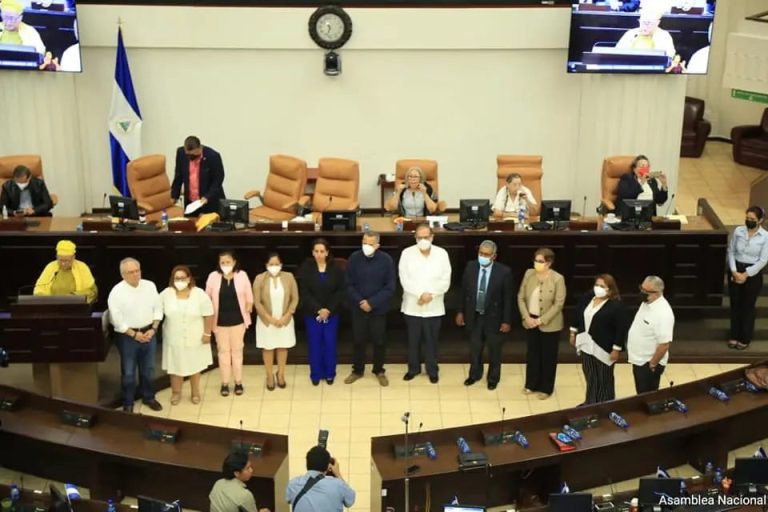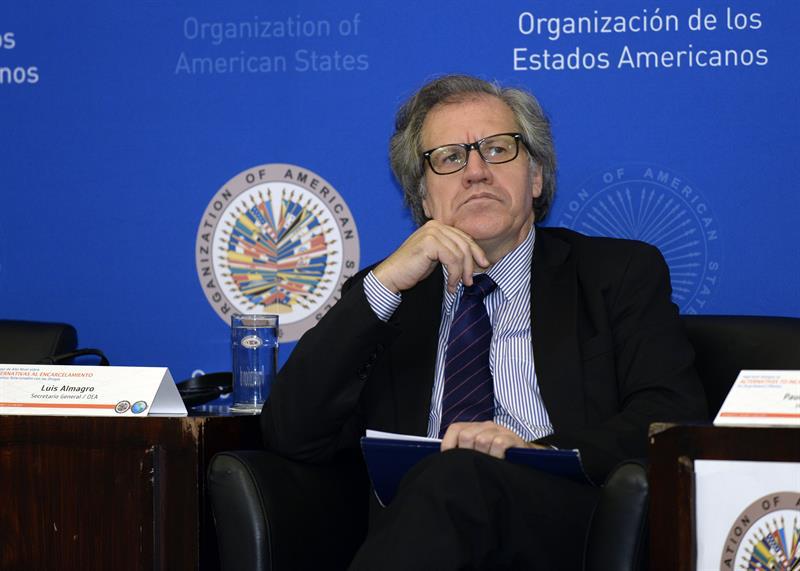9 de mayo 2021

Children of Exile: The Births “Sowing Hope” in the Camp of Nicaraguan Farmers

PUBLICIDAD 1M
PUBLICIDAD 4D
PUBLICIDAD 5D
OAS Secretary General states that changes in the Electoral Council “go against the principles and recommendations” of the international community

The National Assembly, controlled by Ortega deputies and their political allies, swore in the new electoral magistrates. Photo: Taken from the National Assembly.
The Secretary General of the Organization of American States (OAS), Luis Almagro, addressed the political situation in Nicaragua on Thursday. Through an extensive statement, he expressed his “extreme concern” over the designating of Ortega magistrates to the Supreme Electoral Council (CSE) and the approval of an electoral reform by Sandinista Front deputies and their political allies in the National Assembly. Both actions, according to the Uruguayan diplomat, “clearly give the official party an absolute advantage” in the elections next November.
“The General Secretariat of the Organization of American States (OAS) observes with extreme concern the election of the high magistrates who will make up the Supreme Electoral Council (CSE) of Nicaragua and the approval of electoral reforms that go against the principles and recommendations carried out by the international community, including the OAS Electoral Observation Mission in 2017,” reads the statement released by the OAS General Secretariat.
“The election of magistrates and the approval of these reforms designed by the Special Commission on Electoral Affairs of the National Assembly of Nicaragua clearly give the official party an absolute advantage in controlling electoral administration and justice, eliminating the necessary guarantees and minimal institutional credibility for the development of a free and fair electoral process in November 2021,” adds the document.
The statement mentions that the OAS General Assembly resolution, approved on October 21, 2020, entitled “Restoring Democratic Institutions and Respect for Human Rights in Nicaragua Through Free and Fair Elections,” established that the Government of Nicaragua and the opposition must adopt “meaningful electoral reform measures consistent with the applicable international standards…so as to promote free and fair elections.” Among these measures, the resolution considered essential “modernizing and restructuring of the Supreme Electoral Council to ensure it operates in a fully independent, transparent and accountable fashion.”
The National Assembly, controlled by an absolute majority of Sandinista Front deputies after the 2016 electoral fraud, swore in the seven magistrates and three alternates of the Supreme Electoral Council (CSE) on Thursday. With the publication May 5, in the official Gazette, the electoral counter-reform and swearing-in of these magistrates, Ortega deputies thus closed the legislative process regarding changes in the electoral power.
“The election of the new CSE and the reform approved by the legislative power, with the support of deputies of the official party and other deputies, erodes, instead of strengthening, a pluralistic political process that leads to the effective exercise of the civil and political rights of the population. The election of new magistrates in the CSE related to the official party consolidates the concentration of power of the FSLN in all four branches of the State – executive branch, legislative branch, electoral branch, and judicial branch. This arrangement of power is not conducive to Nicaraguans freely electing their leaders under conditions of transparency,” adds the statement from the OAS General Secretariat.
The OAS recalls in its statement the agreements signed and breached by the Ortega regime. These were designed to modernize and give credibility to the electoral power of Nicaragua, after the constant frauds that have allowed the Sandinista Front to cling to power.
“The (Nicaraguan) Government signed two agreements that were repeatedly breached: a) the agreements arising from the “Constructive Dialogue between the Governments of Nicaragua and the General Secretariat of the OAS,” held between October 20, 2016 and January 20 2017, signed in February 2017; b) the failure to implement the recommendations of the OAS Electoral Observation Mission, which were presented to the General Assembly of the Organization in December 2017 and in whose session they were accepted and committed to compliance by the Nicaraguan delegation; c) the agreement reached at the Negotiation Table between the Government of Nicaragua and the Civic Alliance in March-April 2019, which revived the 2018 agreements with the OAS General Secretariat,” it mentions.

Luis Almagro, OAS Secretary General. EFE/Confidencial.
It also recalled in the statement that it was the Government of Nicaragua that requested the presence of the General Secretariat of the OAS, which was established in a document signed and made public on March 20, 2019. Said agreement counted with the presence of witnesses and guarantors of the Nunciature of the Catholic Church of Nicaragua and delegates of the OAS General Secretariat, the regional body.
“This recent election and approval of the electoral reform highlights the unwillingness of the regime – as well as of some political forces – to take actions in favor of democracy and the expansion of political and civil rights of the Nicaraguan population. The OAS General Secretariat recalls that the absence of plurality of parties and the inexistence of separation of powers flagrantly violate the principles of the Inter-American system of which the country is a part,” it points out.
Finally, it urges the Ortega regime and the allied political forces that supported the electoral counter-reform to adopt electoral reform measures consistent with the principles of the effective exercise of democracy and access to human rights “established in the Inter-American legal instruments to which Nicaragua is a signatory.”
This Thursday it was also known that Almagro sent a letter to Ambassador Elisa Ruiz Diaz, Representative of Paraguay and president pro tempore of the OAS Permanent Council, requesting to include the “situation of Nicaragua” in the next session of this entity. In the letter, Almagro also asks to be allowed to make a presentation, precisely to refer to the issue of the sociopolitical crises of Nicaragua. The session is expected to take place next week, possibly Wednesday, May 12.
On Tuesday, Ortega deputies re-elected magistrates Lumberto Campbell and Mayra Salinas, from the Sandinista Front. In addition, they appointed Brenda Rocha Chacon, Alma Nubia Baltodano Marcenaro, Devoney McDavis Alvarez and Adriana Marina Molina Fajardo proposed by the FSLN.
The nomination of the candidates proposed by allied parties was also confirmed: Cairo Amador, proposed by the Nicaraguan Liberal Alliance (ALN); Leonzo Knigtht proposed by the Conservative Party, Alberto Blandon by the Constitutionalist Liberal Party (PLC) and Maura Lizet Alvarez, proposed by the Independent Liberal Party (PLI).
This new make-up of the electoral power implies the departure of the now former magistrates Emmet Lang Salmeron, Luis Benavides Romero, Judith Silva Jaen, Norma Moreno Silva and the alternates Emiliano Enríquez, Virginia Molina and Miguel Angel Melendez.
All of them, along with Roberto Rivas Reyes and the reelected Lumberto Campbell and Mayra Salinas, have been accused by observation organizations and political opponents of endorsing the electoral frauds that have allowed the Sandinista Front to consolidate its political muscle, mainly in the National Assembly.
In the case of Rivas Reyes and Campbell, both are sanctioned by the United States Treasury Department, accused of being key operators in perpetrating these electoral frauds, which have delegitimized the credibility of the Supreme Electoral Council.
The European Union (EU) issued a statement through its spokesperson stating that the electoral reforms are not the product a political dialogue with opposition groups, which was one of the main recommendations to solve the socio-political crisis brought about since the massacre of the civil protests of April 2018.
“The European Union takes note of the reform of the electoral law adopted by the National Assembly of Nicaragua on 4 May and on the appointment of the new magistrates of the Supreme Electoral Council. Unfortunately, both fall short of the recommendations of the 2011 EU Electoral Observation Mission and the recent resolutions by the Organisation of American States (OAS) and by the Human Rights Council. These decisions are not the result of the dialogue between the government and the opposition groups, which the EU has repeatedly called for. They constitute another step away from an inclusive, democratic and peaceful solution to the ongoing political crisis in Nicaragua,” the statement cites.
“The EU will continue to pursue a policy of constructive and critical engagement with the Nicaraguan authorities and use all its relevant instruments to support the rule of law and credible, inclusive and transparent elections in November this year,” the document added.
The election of the magistrates took place in an express session in which the Ortega deputies, together with their political allies from the PLC, ALN, PLI, APRE and the Conservative Party, approved the electoral counter-reform that opens the doors to a new fraud in the November elections.
The counter-reform has been rejected and condemned by opposition political platforms and presidential candidates, who argue that it maintains the same control of the Sandinista Front in all structures of the electoral branch. Likewise, it consolidates the political advantage for Ortega’s party in the coming November elections and grants the dictator, in his capacity as Supreme Chief of the Police, the power to control the political campaign activities of the opposition parties.
Leaders of the main opposition platforms, the National Coalition and Citizens Alliance, expressed in a joint interview in the Esta Noche program that they will face the electoral counter-reform by trying to form a single opposition unification and appeal to pressure from the international community.
During the swearing-in of the new Ortega magistrates, the president of the legislative branch, Gustavo Porras, expressed that the election process of these officials and the approval of the electoral counter-reform represent a “triumph of Nicaraguan democracy, in which it is established that the elections will be carried out with our rules of the game, in a sovereign manner and without foreign interference.”
Archivado como:
PUBLICIDAD 3M
PUBLICIDAD 3D